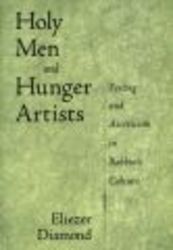Description
The author discusses how rabbinic Judaism has ascetic elements, which is mainly secondary in that the rabbis place no value on self-denial in and of itself. They require of themselves the virtual abandonment of familial, social, and economic life in favor of an absolute commitment to the study of the Torah. This asceticism of neglect dovetails with the rabbinic theology of sin and punishment, which encourages delaying gratification in this world in the hopes of a greater reward in the next.
The existence of ascetic elements within rabbinic Judaism has generally been either overlooked or actually denied. Diamond shows that rabbinic asceticism does indeed exist. This asceticism is mainly secondary, rather than primary, in that the rabbis place no value on self-denial in and of itself, but rather require of themselves the virtual abandonment of familial, social, and economic life in favor of an absolute commitment to the study of the Torah. It is an asceticism of neglect, rather than negation. He also notes that this asceticism of neglect dovetails with the rabbinic theology of sin and punishment, which encourages delaying gratification in this world in the hopes of a greater reward in the next.
